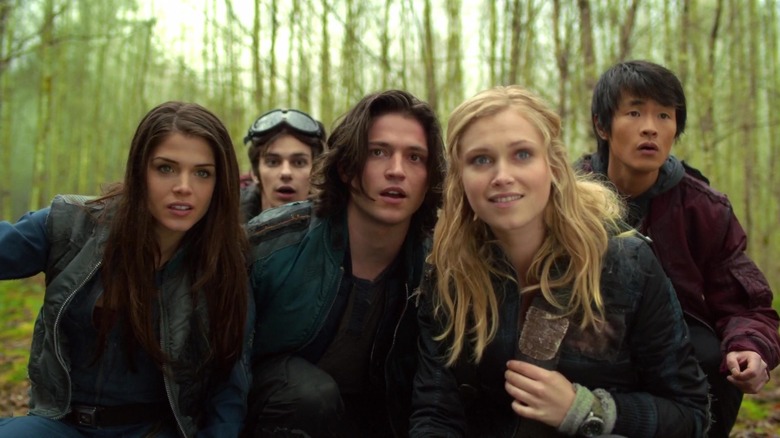
Although it treads well-worn territory, "The 100" is a unique show. The series aired on The CW from 2014 to 2020, receiving critical acclaim -- especially in its early seasons. While it ran on a network known for airing soapy teen dramas, "The 100" is tonally and thematically distinct from its contemporaries. There isn't much typical high school drama, and when there are teenage relationship troubles, it's more "my new love interest is forcing me to execute my ex" than "the popular girl stole my boyfriend."
"The 100" isn't afraid to go there, and go there it does throughout seven seasons. While Clarke Griffin (Eliza Taylor) starts the series as a rebellious teenager, she becomes the de-facto leader of her people. Before leaving her teenhood, she made harrowing decisions. During its first few seasons, "The 100" was extremely popular with the lesbian and queer community, who obsessed over the relationship between Clarke and fierce warrior Lexa (Alycia Debman-Carey) until, well, you know what happened.
Of course, The CW show isn't the first series set in a post-apocalyptic landscape, depicting teenagers in a do-or-die situation. While it was a standout show at the time, plenty of other shows will scratch that particular itch for you. Here's our list of all the shows you should watch if "The 100" is your jam.
The Last Of Us
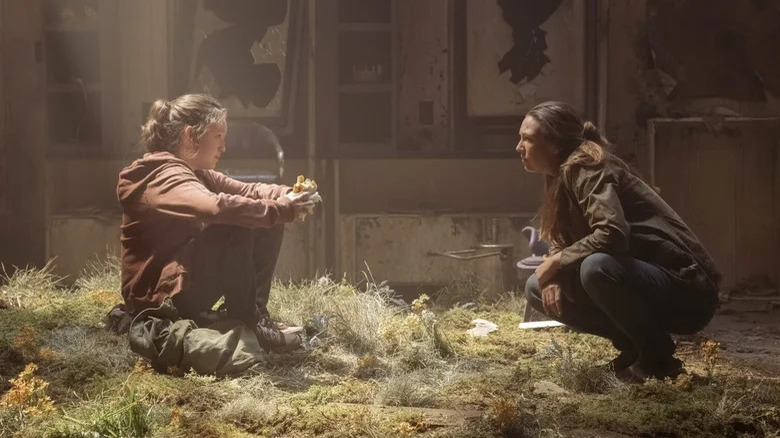
Like "The 100," "The Last of Us" follows a teenage girl fighting to survive in a post-apocalyptic world. Based on the popular video game of the same name, the central character is a 14-year-old girl named Ellie (Bella Ramsey). Ellie is immune to the fungus that has turned most of the population into zombies, and she is traveling the country with Joel (Pedro Pascal), her protector. Other cast members include Gabriel Luna, Anna Torv, Nick Offerman, and Melanie Lynskey.
Though "The Last of Us" is technically a zombie series, it's not what we've come to expect from the genre. Sure, zombies may populate the earth, but the zombies aren't the point: surviving is. As in "The 100," the nature of the apocalypse is not what matters. Instead, the series explores what it means to be left behind. Rather than leaning into the horrors of death and disease, it confronts the horror of isolation. Like Clarke, Ellie is stubborn and defiant, forced to grow up much faster than she should have been. With a stellar cast and a deeply moving narrative, this is one end-of-the-world story that surprisingly gifts you hope.
Yellowjackets
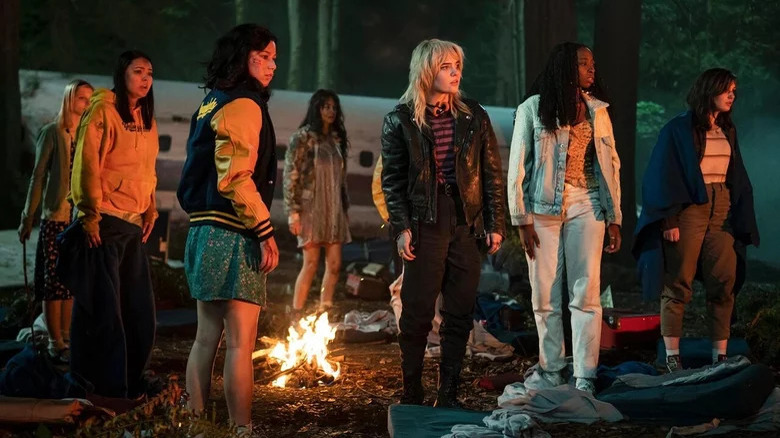
The CW's "The 100" asks us to consider what would happen if a group of teenage delinquents arrived on earth to repopulate humanity following a nuclear disaster. The Showtime series "Yellowjackets" poses a similarly vexing question, asking us to imagine what would happen if a group of high school soccer players became stranded in the woods following a plane crash. Though the plane crash storyline isn't new (see: "Lost"), "Yellowjackets" is singularity brilliant. One of the first things we learn about the characters is that some survived the experience by engaging in cannibalism. Also, we discover that -- at least -- four of the girls survived, but we're unsure of everyone else's fate.
The series covers three timelines. There is the pre-crash timeline, which follows the girls going about their typical teen lives in 1996. Then there is the timeline directly following the crash, which depicts how they did (and didn't) survive. Finally, there's the present-day timeline, which tracks four survivors -- Shauna (Melanie Lynskey), Taissa (Tawny Cypress), Misty (Christina Ricci), and Natalie (Juliette Lewis) -- as they try (without much success) to forget about their time in the woods.
The performances in "Yellowjackets" are outstanding, as is the genius casting of the younger and older counterparts. "Yellowjackets" is a show about survival, and the cost of survival for these young women is high, indeed. Grab a taste, won't you?
The Wilds
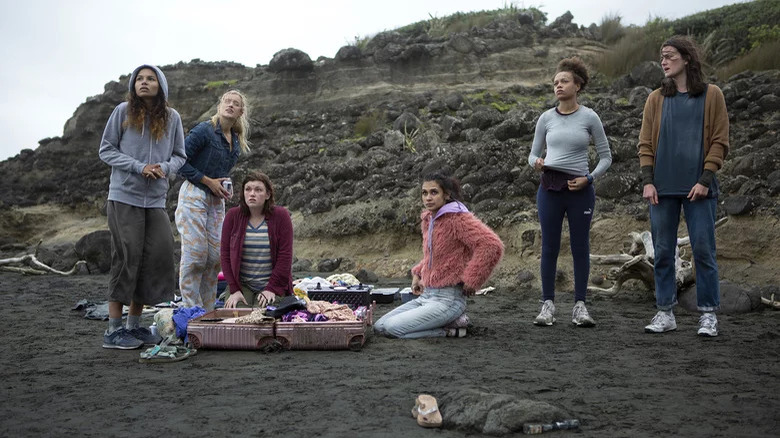
Like "Yellowjackets," "The Wilds" looks at what happens when a group of teenage girls crashes in a remote location. In what initially seems like an homage to "Lost" and "Lord of the Flies," the series follows a group of teenage girls with wildly different experiences stranded on a faraway island. However, this is not a cut-and-dry survival story. Later, the girls realize they're here as part of a social experiment. As in "Lord of the Flies," a new social order emerges while the girls learn to work together to survive.
Fans of "The 100" will appreciate how "The Wilds" depicts the social consequences of an environment where social norms don't exist. "The Wilds" has fascinating characters who possess hidden depths and strengths they never knew they had. Many face dire existential issues back home, and some even feel grateful that they are stranded on an island away from their home lives.
With plenty of twists -- including a world-altering shift at the beginning of season 2 -- the series will keep you on the edge of your seat. Sadly, Prime Video canceled the series after season 2, so we'll likely never see the full story play out. But it's still worth dipping your toes into, especially if intense emotional excavation and unexpectedly sweet sapphic romance are your things!
Station Eleven
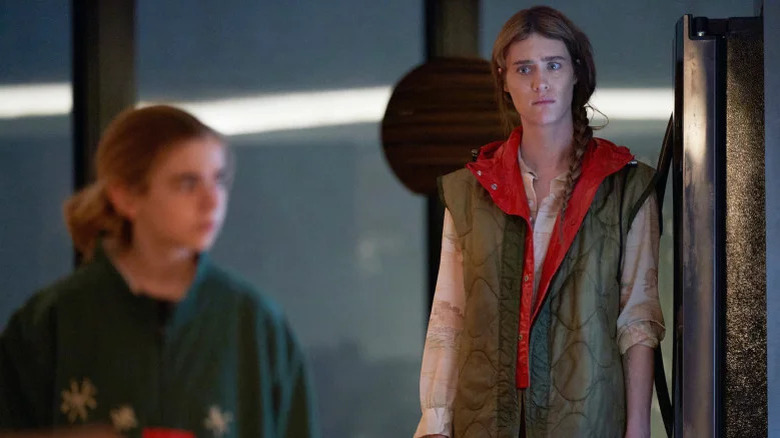
"Station Eleven" is one of the best – if not the best – post-apocalyptic series to have ever graced our screens. Based on the novel by Emily St. John Mandel, the series tracks the consequences of a catastrophic flu outbreak that kills most of the world's population. The central characters are Kirsten (Matilda Lawler), a child actor who is eight years old when the pandemic hits, and Jeevan (Himesh Patel), a young man who becomes her unwitting caretaker. The series follows several timelines – pre-pandemic, the days and months immediately following the pandemic, and 20 years after the pandemic.
In the latter timeline, we meet an older Kirsten (Mackenzie Davis), who lives and works with a traveling Shakespeare company. Though a devastating pandemic is the backdrop of the series, what it focuses on is the power that art has to give life meaning. Arguably, the most important character in the series is Miranda (Danielle Deadwyler), a traumatized woman who finishes a profound graphic novel just before the apocalypse hits. Her novel is one of the things that has kept Kirsten alive, and Kirsten isn't the only one who has been affected by it.
While you might be hesitant to watch a show about a pandemic when we are living through one, it's not as depressing as you'd imagine. Despite the dire circumstances of the setting, "Station Eleven" is one of the most hopeful shows in recent memory: It's proof that life – and love, and art – can continue, despite all odds.
The Leftovers
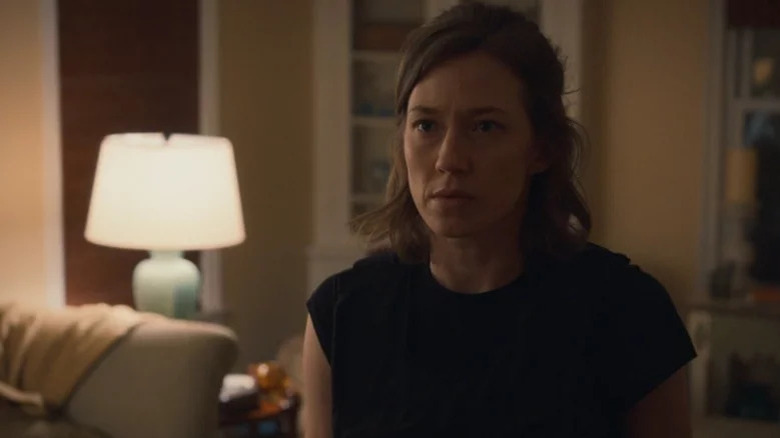
"The Leftovers" is a post-apocalyptic series where the apocalypse looks different than we've seen previously. Created by "Lost" co-creator Damon Lindelof and novelist Tom Perrotta, the series takes place three years after the "Sudden Departure," an unexplained event wherein 2% of the world's population disappeared. While the percentage of people missing is relatively small, it also means that most people know someone who disappeared -- making the ripple effects of the event enormous.
The series focuses on Kevin Garvey (Justin Theroux), the police chief of Mapleton, New York, Nora Durst (Carrie Coon), a woman who lost her husband and kids, and Nora's brother, Reverend Matt Jamison (Christopher Eccleston). The Sudden Departure resulted in several cults emerging, and Kevin's wife, Laurie (Amy Brenneman), joined a mysterious one called the Guilty Remnant.
Like most post-apocalyptic shows, "The Leftovers" is not about the apocalypse: It's about what it takes to survive and the stories we tell ourselves to keep living. The apocalyptic event in the show is relatively undramatic, which almost makes it more difficult for those left behind to rationalize their continued existence. Nonetheless, "The Leftovers" isn't without hope, which is one of the things that makes it such an invigorating, stirring watch.
Fear The Walking Dead
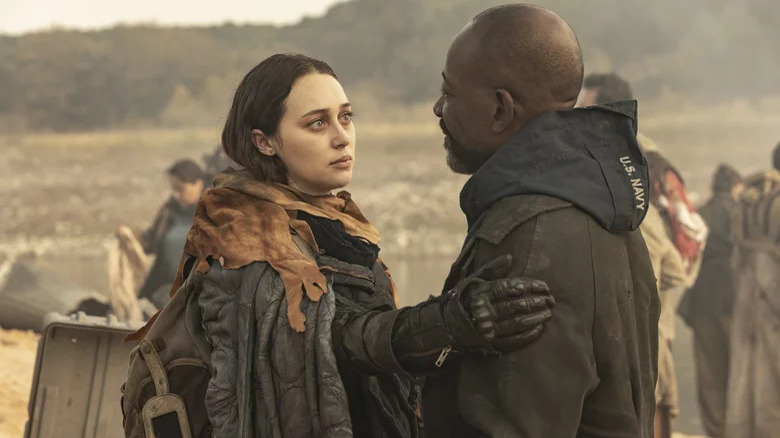
"The Walking Dead" may be the first of AMC's uber-popular zombie series, but "Fear The Walking Dead" comes first in its timeline. The spinoff series is a prequel to "The Walking Dead," focusing on a blended family unit of survivors. There's the former guidance counselor Madison Clark (Kim Dickens), her daughter, Alicia (Alycia Debman-Carey), her son, Nick (Frank Dillane), her fiance, Travis (Cliff Curtis), Travis' son, Chris (Lorenzo James Henrie), and Chris' mother, Liza (Elizabeth Rodriguez).
Fans of "The 100" might be interested in this show because it stars Debnam-Carey, and her casting in the series is why she left "The 100." (However, Lexa fans might find the series a little too triggering.) By replacing the inadvertent family structure of the original series with a blended family, "Fear The Walking Dead" transplants apocalyptic drama to a setting most will recognize.
The immensely talented Debnam-Carey is a standout performer, as is Kim Dickens as her tough-as-nails mother. The blood and guts aren't as immediate as in the original series. Gone are the horrific silences of a barren wasteland. Instead, the urgent peril of inevitable destruction follows the dysfunctional family on their journey.
Snowpiercer
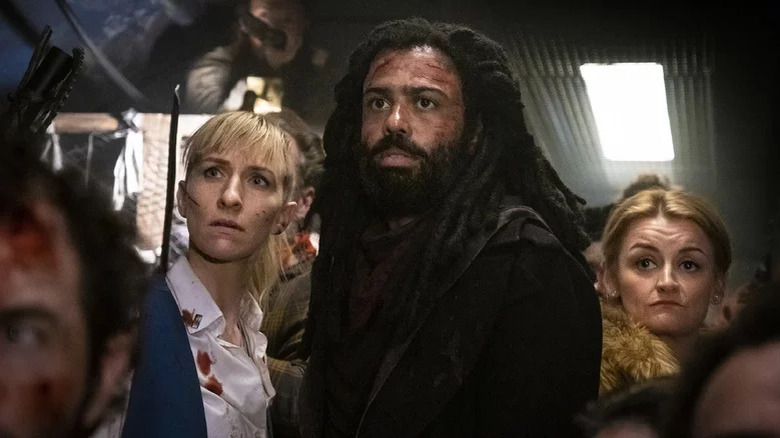
If you're a fan of Korean director Bong Joon-ho, you're probably aware of "Snowpiercer," the 2013 film that first got him recognized by American audiences. The TNT series is not a remake or a reboot of the film. However, it does have its roots in Bong's adaptation of the French graphic novel of the same name. His version begins seven years after a futuristic Earth's ice age on a thousand-car train that houses the planet's remaining residents. Much like "The Hunger Games," the residents of this train are divided into distinct classes. Citizens at the front of the train receive luxuries, whereas those at the back fight for scraps.
The series' two main characters represent these opposing sides. Jennifer Connelly plays Melanie, the head of hospitality, while Daveed Diggs plays Andre, a former homicide detective hell-bent on sparking a revolution of the lower classes. As the last homicide detective alive, Daveed becomes forced to break from revolution-starting when someone murders a passenger. Though the TNT series isn't as hard-hitting as the film, it does go off the rails – pun intended – in a way that is, at the very least, an entertaining detour. The Guardian called the first season of the series "steampunk Law & Order," which gives you a sense of the kind of genre-bending that goes on here.
Raised By Wolves
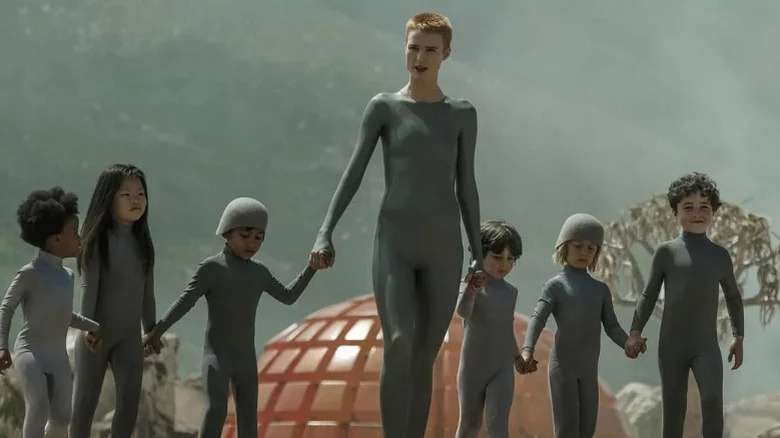
While "The 100" examines what might happen if humans were able to return to earth following a nuclear meltdown, "Raised by Wolves" proposes an even more novel premise. The HBO Max series is one of the strangest shows of the last decade, which alone might be enough of a reason to watch it. The series begins in the 22nd century, following the destruction of the earth. A war between atheists and a group of devout believers called the Mithraic devoured the planet.
The story begins on the planet Kepler-22b, where two androids, Mother (Amanda Collin) and Father (Abubakar Salim), have been tasked with populating their version of Eden. Campion (Winter McGrath) is the only child to survive their child-rearing, which leads Mother to steal another group of children from a Mithraic. Mother takes the adopted child of Marcus (Travis Fimmel) and Sue (Niamh Algar), two atheists who took over the lives of the Mithraic to survive the war.
If that all sounds pretty convoluted, well, it is. But even if the plot can be hard to follow, it's easy to appreciate its ambitious swings. Rather than trying to understand every little detail, it's best to let the eccentricities wash over you. If you can handle feeling a little discombobulated for several episodes, it's worth taking the leap.
Runaways
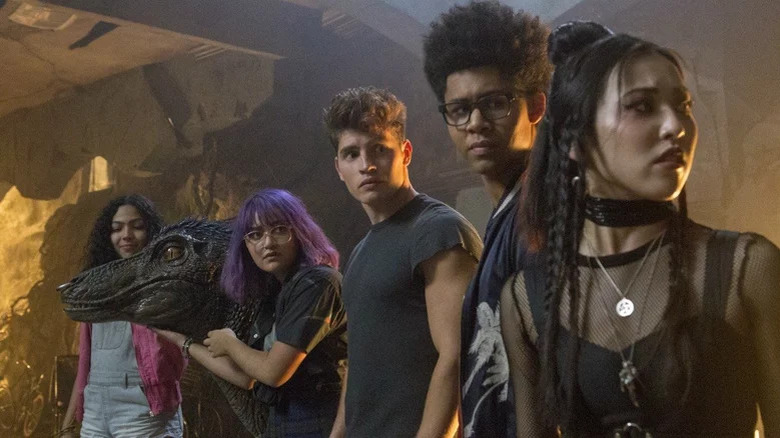
"Runaways" may be the only show on this list without an apocalyptic or survivalist premise. Still, it aligns well with some of the themes in "The 100." Despite its dark subject matter, "The 100" is still a teen show on The CW, making it a pretty unique mashup of genres. "Runaways" has a similar genre-bending quality -- like "Gossip Girl" meets "The Avengers." That comparison is spot-on, as "Runaways" was created by "Gossip Girl" producers Josh Schwartz and Stephanie Savage.
Based on the Marvel comics, "Runaways" follows a group of well-off teenagers living in Los Angeles. They soon discover that they each have a superpower (or at least a super-skill), and a series of complications force them to go on the run. Soon they realize their biggest enemies are their parents, who may be more villainous than they could have imagined.
All the teen characters are compelling and charming, and their parents are perfectly cast, with James Marsters and Brittany Ishibashi giving standout performances. The series impressively balances typical teen drama – crushes, hating your parents, etc. – with sci-fi intrigue, resulting in a satisfying blend of melodrama, humor, and action. Glossier than your average superhero show but more peculiar than a typical teen show, "Runaways" is a salty-sweet pleasure.
The Expanse
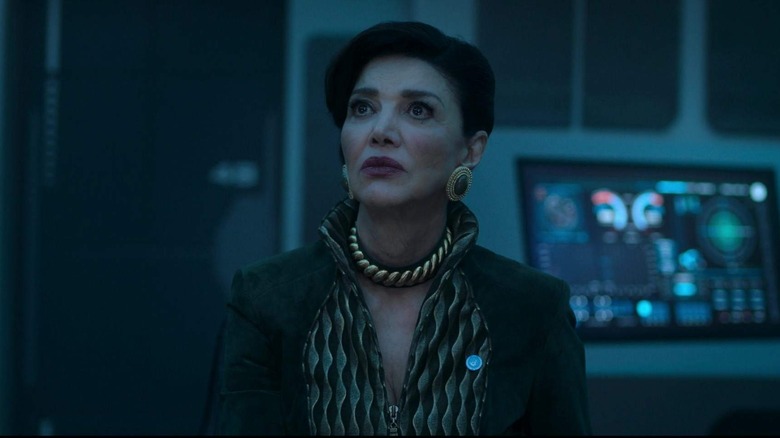
The premise of "The Expanse" isn't quite a dystopia, but it certainly isn't a utopia. Set in a future where human beings have colonized the solar system, "The Expanse" lives up to its classification as a space opera. The series imagines a world wherein humanity has conquered space, but all of our social and political problems - racism, classism, etc. – have remained in place. Earthlings colonized the Moon and Mars, and Mars has emerged as a military state intent on breaking free from Earth. Meanwhile, the working class is known as "Belters," who spend their lives mining the asteroid belt far away from the habitable planets.
We learn about this brave new world through the lens of three main characters, though the cast expands as the series evolves. There's United Nations Security Council member Chrisjen Avasarala (Shohreh Aghdashloo), who fights hidden political battles, Josephus Miller (Thomas Jane), a hard-boiled Belter detective, and ship's officer James Holden (Steven Strait), who is on the run after an ice hauling trip gone wrong.
Each character finds themselves embroiled in a dangerous conspiracy connected to warring factions and the pressures of new alien technology. It's one of the very best sci-fi shows of the last decade. In a just world, it would have reached the level of popularity that "Game of Thrones" found. You might want to do your part and get on board with this one!
Falling Skies
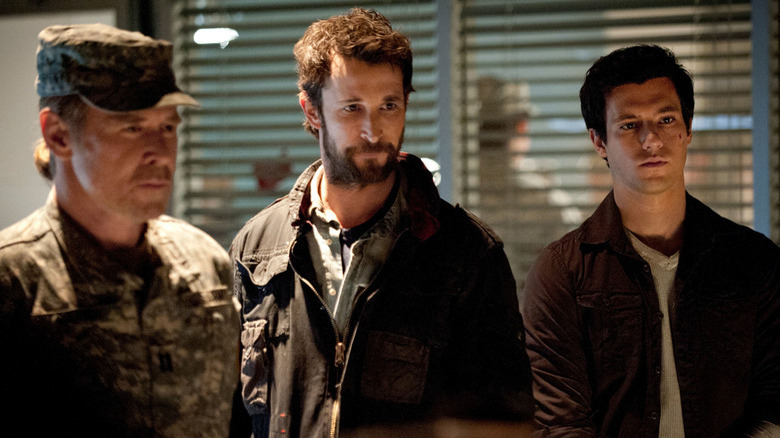
Steven Spielberg is no stranger to global disasters and existential threats, which is why his role as an executive producer on the TNT series "Falling Skies" makes a lot of sense. Fans of Spielberg's underrated version of "War of The Worlds" are especially well-suited to enjoy "Falling Skies," as it tackles an apocalypse of the alien variety. The series follows Tom Mason (Noah Wyle), a Boston history professor thrown into action following an alien attack. After the murder of his wife and his son's capture, Tom decides to join a makeshift military regiment to protect the survivors from further attacks. Tom uses his extensive knowledge of military history to form a plan of attack, but the reasons behind the alien invasion remain a mystery.
In many ways, "Falling Skies" feels like a summer blockbuster -- even if it's a five-season TNT show. Although it has a shaky start, "Falling Skies" improves as it continues, gaining more complexity and intrigue by the time Season 3 hits. The show's characters and existential themes become more fleshed out as things progress. However, Spielberg's recognizable brand of optimism remains under its bleak surface. As in "The 100," "Falling Skies" compels us to think about what we might take into a new world, and the answers to that question may surprise you.
Read this next: The Weirdest Kisses In Sci-Fi Movie History
The post Shows Like The 100 That Are Worth Your Time appeared first on /Film.
